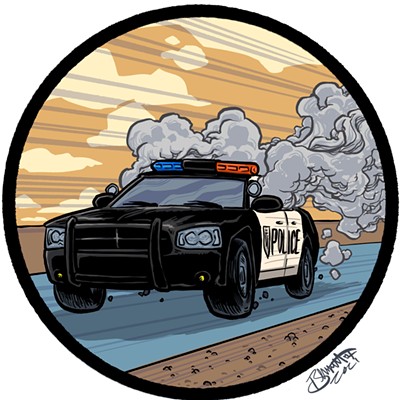
The husband and father (pictured) also never anticipated he’d be at the center of a constitutional fight over free speech and a potentially unconstitutional city ordinance.
Martin, considered a big man by any standard at 6 feet 2 inches tall and 485 pounds, arranged for a security team to work a private birthday party at the former Casablanca restaurant and bar, 13801 Quail Pointe Drive.
As the party was about to end, Martin rushed outside to investigate the reason three white men were beating a lone black male in the parking lot.
Seeing they were armed with handguns, Martin demanded to know what was happening, the identities of the three white men and if they were bounty hunters or police officers. Getting no replies, Martin’s verbal requests got louder and more intense, he told Oklahoma Gazette in a recent interview.
That was when Martin was told he would be going to jail, according to a federal civil rights lawsuit filed in U.S. Western District Court last week.
It turns out the three men were Oklahoma City police officers, but that fact wasn’t apparent at the time, the lawsuit alleges. Martin and his attorney claim in their suit that the officers were dressed in civilian clothing, did not display badges and did not identify themselves.
Instead, Martin claims, the officers yelled obscenities at Martin, telling him, “Back the f— up. You’re going to jail. Shut the f— up.”
Martin’s attorney, Nathan Harper, claims his client did not interfere with the officers while they wrestled with a publicly drunk suspect in the club’s parking lot.
“He (Martin) was arrested because he was speaking and wanted to know what they were doing,” Harper said. “He had every right to do that.”
However, the officers — identified in the lawsuit as Ryan Sorrels, Russell Mock, Jacob McClain and Lt. Bill Vetter — had other ideas.
Vetter, with a badge around his neck, arrived at the scene moments later. As Vetter approached, Martin saw the badge and backed up, the lawsuit alleges. However, before Martin could return to the club, he was arrested on a misdemeanor complaint of disobeying a lawful command, handcuffed and placed in the back of a squad car.
That was just the beginning of Martin’s troubles.
“I had been in the (patrol) car about 25 to 30 minutes with the heat turned on, and I couldn’t feel my hands,” he told the Gazette. “I’m a big man, but they put the small cuffs on me.”
Martin was booked into the Oklahoma County Jail, where he spent 18 hours with little water and no food before he was released on bond.
Martin, who says the officers used excessive force, claims he still suffers from injuries to his hands and arms, which are scarred and disfigured.
The video
Municipal counselors began prosecuting Martin about six months later, on April 2, 2012, but a judge declared a mistrial the same day, when an iPhone video of the episode surfaced at the last minute.
The case was dismissed with prejudice, which means Martin can never be tried in connection with that incident again.
The officers’ actions were not improper, Assistant Municipal Counselor Richard Smith said.
“I
don’t believe it (the ordinance) was unconstitutionally applied. I
don’t think the ordinance is unconstitutional,” he said. “Have you seen
the video? He was trying to prohibit them from making the arrest.”
Constitutional arguments
Harper
claims in the lawsuit that Martin’s First Amendment freedom of speech
rights were violated and the city ordinance used to arrest and prosecute
his client is vague and unconstitutional. The lawsuit alleges Martin
was arrested because of his comments that “merely questioned their
identities and authority.”
“The First Amendment challenge is important to all citizens of Oklahoma City,” Harper said.
“It was the speech that got him arrested, and he was the only one doing the talking.”
Challenging the city’s interference ordinance is long overdue, the attorney said.
“Interference cases
deserve extra scrutiny because there was no other core criminal activity
going on. It’s used as a generic catch-all when there’s no other
charges to be filed,” he said.
The
ordinance reads, “Any person who interferes, obstructs, attempts to
obstruct or disobeys a lawful command of any police officer in the
discharge of his/her duties, by any means other than by threat,
intimidation or force is guilty of a Class ‘A’ offense.”
Susan Knight, the attorney for the four officers, did not return calls for comment.
OKC Police Chief Bill Citty and the city are named as co-defendants.
Seldom enforced
In
OKC, the interference ordinance is rarely cited, according to arrest
and prosecution records provided by the municipal counselor’s office.
From
Sept. 4, 2010, to Sept. 4, 2013, the city legal staff considered
charges against 31 people for interference arrests. Two cases were
dismissed by municipal judges, 10 people pleaded no contest and four
were found guilty.
In
13 of the cases, the municipal counselors declined to prosecute. In two
other cases, the dispositions were not available. The fine, if
convicted, is $163, Harper said.











